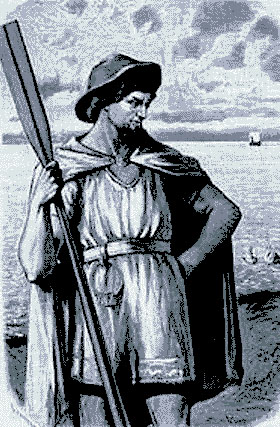Njörd (Old Norse Njörðr) is a prominent god in Norse mythology. Originally from the Vanir tribe, Njörd and his two children Freyr and Freyja were exchanged as a sort of hostages after the Aesir-Vanir war to ensure the peace. The war between the two tribes of gods has always fascinated me. It was the first war in the world, yet the two parties were so evenly matched, in the end they decided on a truce.
As a member of the Vanir tribe, Njörd is also one of the few who will survice Ragnarök, said to then return to Vanaheim.
Njörd Key Facts
| Parents | Unknown |
| Partners | Skadi |
| Siblings | None mentioned |
| Offspring | Freyr and Freyja |
| Tribe | Vanir |
| Old Norse name | Njǫrðr |
| Other names | None |
| The God of | Seafaring and Prosperity |
| Ass. Animal | Seagull |
Name and Etymology
The name “Njord” in Old Norse is “Njǫrðr”. This name has deep roots that trace back to ancient Germanic traditions, and it remains a popular boy name even today. It corresponds to the older Germanic fertility goddess Nerthus, who was revered as early as the 1st century AD. Both Njörðr and Nerthus derive from the Proto-Germanic theonym *Nerþuz.
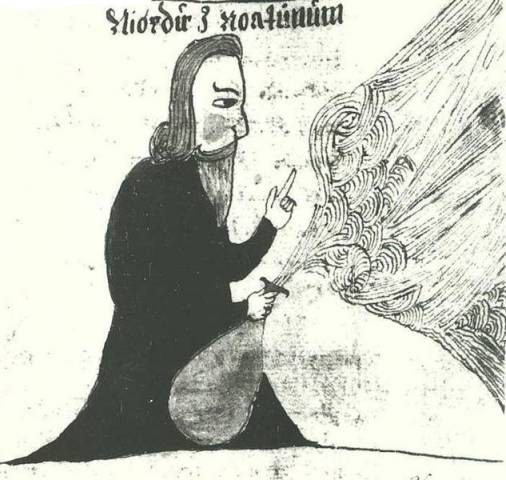
The exact meaning of Njörðr’s name remains a subject of debate among scholars. Some suggest it may be related to the Irish word “nert,” which translates to “force” or “power”. This connection hints at the strength and influence attributed to this deity.
Further adding to the complexity of Njörðr’s name is its potential connection to another Norse goddess, Njörun. The intricate web of names and their meanings showcases the rich tapestry of Norse mythology and the fluidity of beliefs over time. Honestly, when you dive into Norse mythology, you just have to accept that there is so much we will never really know. However, it was a religion and mythology that evolved through the centirues.
Njörðr’s influence wasn’t just limited to myths and legends; it permeated everyday life. His name is etched in various place names across Scandinavia. Moreover, the Old Norse term “Njarðarvǫttr,” which translates to “Njörðr’s glove”, is a testament to his pervasive presence. Personally I want to note that the term “vöttr” is more fittingly translated as “mittens” rather than “gloves”, a distinction that offers a more accurate glimpse into the cultural nuances of the time.
Njord’s Origins and Family
Njord, a prominent deity of the Vanir tribe, has a lineage that is both intriguing and complex. The Vanir, known for their association with fertility, prosperity, and nature, often intermingled with the Aesir, another dominant tribe of gods in Norse mythology.
Njord’s familial ties are deeply intertwined with both love and conflict. He had a sister, whose name remains elusive in the ancient texts, but their relationship went beyond mere siblinghood. She was not only his sister but also his wife. From their union came two significant deities: Freyr and Freyja. Both inherited the prominence of their father in the Norse pantheon, with Freyr becoming the god of fertility, peace, and prosperity, and Freyja emerging as the goddess of love, beauty, and fertility.
The dynamics between the Aesir and Vanir tribes were not always harmonious. Following the Aesir-Vanir war, a conflict that arose from the differences and rivalries between the two tribes, a truce was established. As part of the peace agreement, a hostage exchange took place. Njörd, along with his children Freyr and Freyja, left the Vanir to live among the Aesir. This move symbolized the merging of the two tribes and the hope for a harmonious coexistence. Njörd settled in his realm, Noatun, where he continued to exert his influence over the seas and prosperity.
Skadi – Wife of Njörd
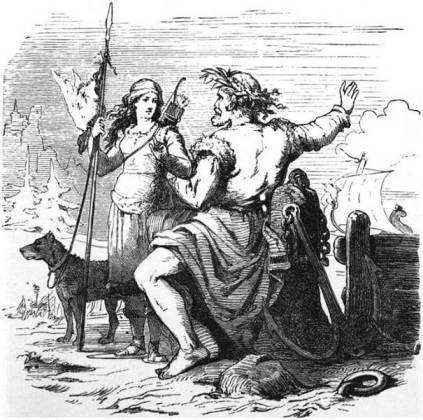
When Njord and his children, Freyr and Freyja, moved to Asgard after the Aesir-Vanir truce, they encountered the customs and norms of the Aesir. One such norm was the Aesir’s disapproval of close familial unions, which meant Njord’s sister-wife, a significant figure in his life, couldn’t accompany him. This separation marked a turning point in Njord’s life, as he navigated the ways of the Aesir without his longtime partner.
Enter Skadi, a mountain-dwelling giantess. After Thor killed her father, the jötun Thjazi, she went to Asgard to demand compensation. This was an actual tradition in the Viking Age, where one could at times pay oneself out of a bloodt-debt.
Part of the agreed compensation was that Skadi would choose a husband from among the Aesir. Skadi decided to make her choice based solely on the appearance of their feet. Believing that the most beautiful feet would belong to the handsome god Baldur, she made her selection. However, in a twist of fate, the feet she chose belonged not to Baldur but to Njord.
Their union, born out of mistaken identity, began with hope. Skadi, with her love for the snowy mountains, and Njord, with his passion for the sea, tried to bridge their contrasting worlds. They attempted to find a middle ground by spending alternating periods in each other’s domains. However, the differences were too stark. The relentless noise of seagulls was jarring for Skadi, while Njord longed for the rhythmic sound of waves. These disparities, emblematic of the chasm between the mountains and the sea, eventually led to the end of their relationship.
Njord’s Roles And Responsibilities
Njord, with his vast dominion over the seas, held a pivotal role both among the gods and for humans. As the god of seafaring, sailors and fishermen frequently invoked his blessings, seeking safe voyages and bountiful catches. His influence over the seas brought him close to the realms of Aegir and Ran, two other deities deeply associated with the ocean. While Aegir was known for hosting grand feasts for the gods and brewing ale, Ran was known for her net with which she caught drowned sailors. Njord’s association with these two further emphasizes his profound connection to all aspects of the sea, from its bounties to its dangers.
But Njord’s responsibilities weren’t just confined to the vast oceans. He was also revered as the god of prosperity. In fact, he was often considered the wealthiest among the gods. His affluence wasn’t just in terms of gold and treasures but also in the richness of the seas, the abundance of harvests, and the prosperity of lands. This role of his is underscored by one of his kennings found in the Skáldskaparmál: “God of Wealth-Bestowal”. This title not only highlights his immense wealth but also his generosity in bestowing it upon those who sought his blessings. It’s no wonder that people prayed to him for wealth, abundance, and prosperity in their lives. Among the gods, Njord was a symbol of peace and was often called upon to mediate disputes, further emphasizing his balanced and prosperous nature.
Depiction And Characteristics
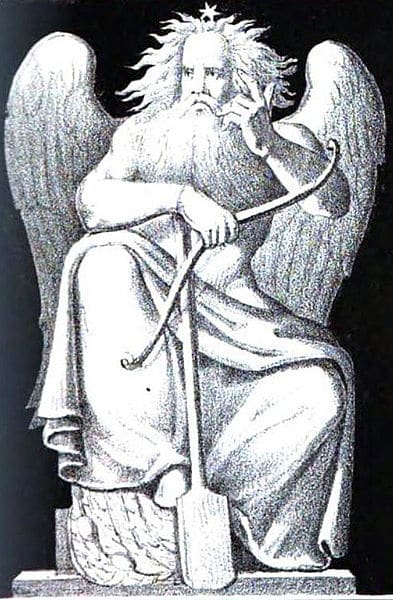
Njörd was perceived as a calm and wise deity. Unlike the stormy seas, he embodied the tranquil aspects of the ocean. His personality was reflective of the calm shores and bountiful coasts. In myths, he’s often portrayed as a mature, bearded man, sometimes holding a fishing net, symbolizing his dominion over the seas and its creatures.
Njord’s Place in Worship and the Fertility Cult
In ancient Norway, the significance of fertility cults is evident through the discovery of stone phalluses, symbols of male potency and fertility. Central to many rituals was the winter solstice “blot” festival, a time of celebration and anticipation for a bountiful year. During these ceremonies, Njord and his children, Freyja and Freyr, were revered and worshipped. Elves, representing both fertility and death, also played a crucial role in these rituals. The historian Tacitus, writing in the 2nd century AD, mentioned the female deity Nerthus, who some believe evolved into the male deity Njord over time. The presence of stone phalluses in graves and the rituals surrounding them suggest a deeply rooted fertility cult. This tradition of worshiping Njord and his offspring can be traced back at least 500 years before the onset of the Viking Age, highlighting their enduring importance in Norse spirituality.
Njord’s Symbols, Artifacts or Animals
Njord, a central figure in Norse mythology, has a deep-rooted association with symbols of fertility and prosperity. One of the most prominent symbols tied to him is the phallus. Stone phalluses, found across ancient Norse archaeological sites, played a pivotal role in rituals and ceremonies, emphasizing male potency and Njord’s role as a deity of abundance and growth.
Further enriching Njord’s symbolic tapestry is the boar, an animal intrinsically linked to him through his children, Freyja and Freyr. Both these deities have boars as their associated animals, weaving a narrative of fertility and abundance throughout the family lineage. The boar, known for its prolific breeding habits, naturally emerged as a symbol of fertility in Norse culture. Its frequent appearances in tales and myths surrounding Njord’s offspring not only highlight the importance of the boar but also reinforce Njord’s overarching theme of prosperity, abundance, and the cyclical nature of life.
Play Fun Norse Quiz
Is this article making you even more curious about Norse gods and goddesses? You can satisfy your curiosity by playing a fun Norse mythology quiz. This way, you can test your knowledge about Norse gods and goddesses, as well as fill in some gaps. Good luck and have fun playing!
Don’t forget to try our other games as well!
Myths about Njord
Njord, the god of seafaring and prosperity, has been the subject of numerous myths and tales that have been passed down through the ages. His stories, as vast as the seas he governs, offer a glimpse into the beliefs and values of the Norse people.
Njord and Skadi: A Mismatched Marriage
One of the most intriguing tales surrounding Njord is his marriage to the giantess Skadi. Following the death of her father Thjazi at the hands of the Æsir, Skadi sought reparation. As part of the compensation, the gods allowed her to choose a husband from among them, but with a peculiar condition: she could only see their feet. Believing that she would select the handsome god Baldr based on the beauty of his feet, Skadi was surprised to find that she had chosen Njord instead.
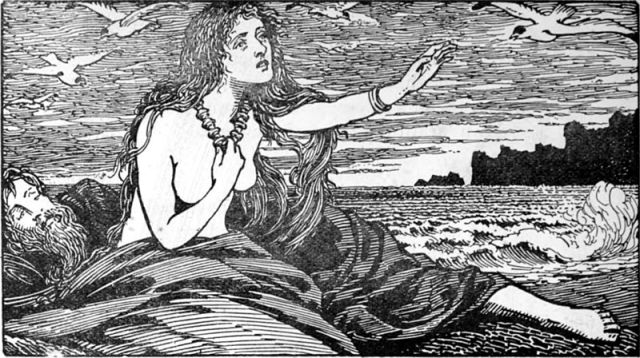
Their union, however, was marked by stark differences. Skadi, a lover of the snowy mountains, and Njord, who cherished the sea’s shores, found it challenging to choose a shared abode. They attempted a compromise: they would spend nine nights in Skadi’s mountain home, Thrymheimr, and then three nights in Njord’s sea dwelling, Noatun. Yet, neither was content in the other’s domain. Skadi couldn’t bear the noise of the seagulls, while Njord longed for the comforting sound of the waves. Their differences eventually led to the dissolution of their marriage, with Skadi returning to her beloved mountains and Njord to his cherished seas.
Njord’s Role in Ragnarok
Ragnarok, the prophesied cataclysm that spells the end for many gods, is a pivotal event in Norse mythology. Amidst the chaos and destruction, the fate of many deities is sealed. Yet, Njord stands as an exception. As revealed in “Vafþrúðnismál,” Njord is destined to survive this cosmic upheaval. The poem provides a profound insight into his origins and destiny, stating, “In Vanaheim the wise Powers made him and gave him as hostage to the gods; at the doom of men he will come back home among the wise Vanir.”
This revelation is significant for several reasons. Firstly, it underscores Njord’s unique position among the gods. While he was given as a hostage to the Æsir by the Vanir, his roots remain with the latter. His eventual return to the Vanir post-Ragnarok signifies a full-circle journey, reuniting with his original tribe.
Furthermore, the fact that Njord, along with the Vanir, will survive Ragnarok hints at their enduring and resilient nature. While the Æsir face annihilation, the Vanir, often associated with fertility and prosperity, seem to symbolize rebirth and continuity. Njord’s survival and return to the Vanir might also reflect his inherent nature as a peacemaker and mediator. In the aftermath of Ragnarok, his calming presence could be instrumental in restoring balance and harmony to the new world that emerges from the ashes of the old.
Mentions in Ancient Texts
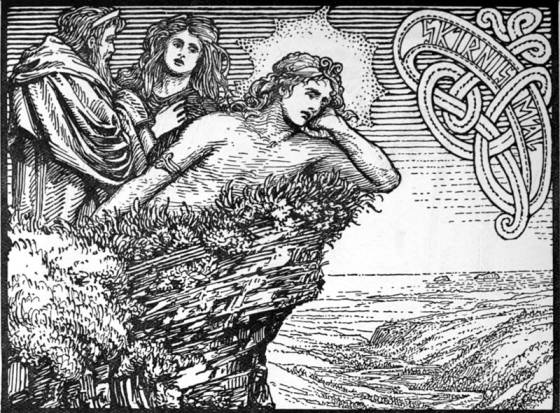
Norse mythology is extensively documented in ancient texts, with the Poetic Edda, Prose Edda, and Heimskringla being primary sources that provide detailed narratives and insights into the gods and goddesses, including Njörðr.
Poetic Edda
The Poetic Edda, a collection of Old Norse poems, offers a wealth of information about Njörðr, shedding light on his roles, relationships, and significance in Norse mythology.
Vafþrúðnismál
In the poem Vafþrúðnismál, Njörðr is described as a future survivor of Ragnarök. The god Odin, in disguise, engages in a wisdom contest with the jötunn Vafþrúðnir. During their exchange, Vafþrúðnir speaks of Njörðr’s origins:
“In Vanaheim the wise Powers made him
and gave him as hostage to the gods;
at the doom of men he will come back
home among the wise Vanir.”
Grímnismál
Grímnismál mentions Njörðr’s hall in Nóatún and describes him as a “prince of men” who rules over a “high-timbered temple.” The poem also touches upon the creation of Freyr’s ship, Skíðblaðnir, and cites Freyr as Njörðr’s son.
Lokasenna
In Lokasenna, a flyting poem, Njörðr and Loki engage in a sharp exchange. Loki taunts Njörðr about his origins and marital relations, while Njörðr defends his status and lineage.
Þrymskviða
In Þrymskviða, Njörðr is referred to as the father of the goddess Freyja. The jötunn Þrymr mistakenly believes he will marry Freyja and refers to her as Njörðr’s daughter.
Prose Edda
The Prose Edda, written by Snorri Sturluson, delves deeper into Njörðr’s tales, providing a more structured narrative of his life and relationships.
Gylfaginning
In Gylfaginning, Njörðr is introduced as a god who resides in Nóatún and governs the winds, sea, and fire. He is described as wealthy and can grant prosperity to those who seek his blessings. His marriage to Skaði and the challenges they faced due to their contrasting preferences for the mountains and the sea are also detailed.
Skáldskaparmál
Skáldskaparmál provides various kennings for Njörðr and recounts the tale of Skaði’s father, Þjazi. The poem also touches upon Njörðr’s relationship with Skaði and their eventual separation.
Heimskringla
Heimskringla, a collection of sagas about Norwegian kings, also mentions Njörðr, particularly in the Ynglinga saga.
Ynglinga saga
In the Ynglinga saga, Njörðr’s reign is described as a time of peace and prosperity. He is revered as a god who ensures bountiful crops. The saga also delves into Njörðr’s marriage to Skaði and their contrasting preferences for the sea and mountains. The saga recounts Njörðr’s death, his cremation, and the deep sorrow of the Swedes at his passing.
Saga of Hákon the Good
The Saga of Hákon the Good describes the pagan custom of Yule and mentions toasts dedicated to Njörðr and Freyr, signifying their importance in rituals and celebrations.
Saga of Harald Graycloak
In the Saga of Harald Graycloak, a stanza from the poem Vellekla by the skald Einarr skálaglamm uses a kenning for Njörðr, further emphasizing his significance in Norse poetry and culture.
Frequently Asked Questions
Njörd is the god of seafaring and prosperity in Norse mythology.
Njörd was married to the giantess Skadi.
Yes, Njörd had two children, Freyr and Freyja.
Njörd is a member of the Vanir tribe.
Yes, Njörd is frequently mentioned in the “Prose Edda” by Snorri Sturluson.
The ancient texts don’t provide a clear account of Njörd’s role in Ragnarok.
Featured Image Credit: W.G. Collingwood (1854 – 1932), Public domain, via Wikimedia Commons

